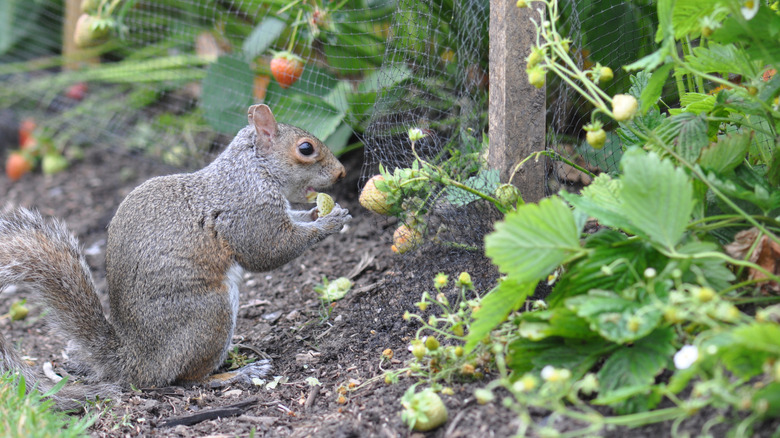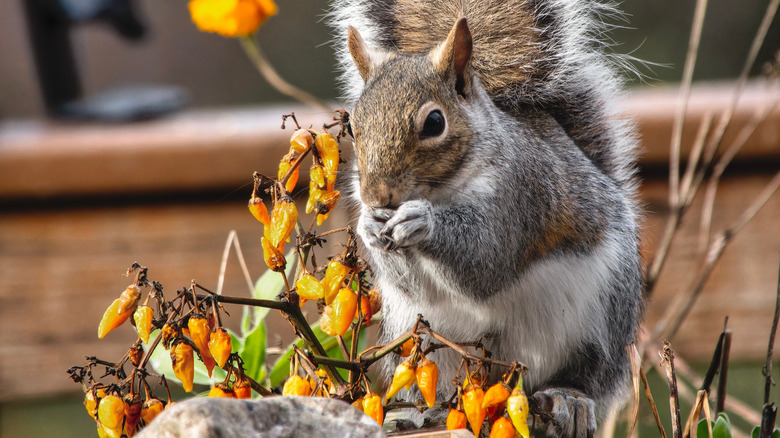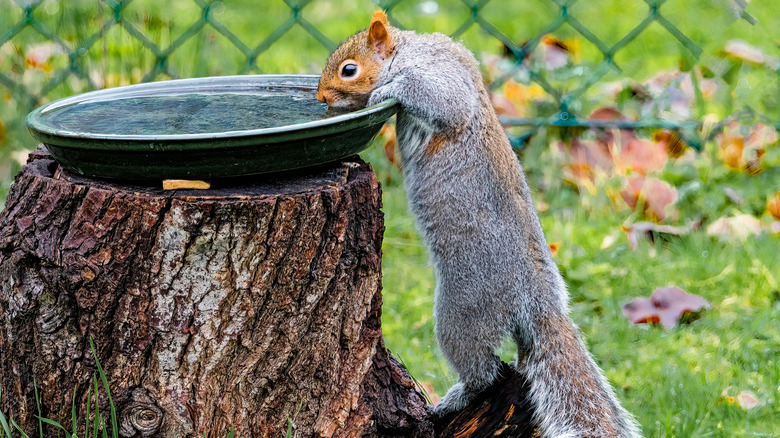The Flavor-Packed Veggie That's Said To Repel Garden Squirrels (& If It Really Helps)
If you're battling squirrels in your garden, you've probably read about all kinds of tricks and tips to keep them out. You've also probably watched squirrels bypass or ignore many of those methods. They're determined critters when it comes to finding a tasty snack. The idea of adding plants to your garden to repel squirrels sounds nice in theory, and some plants, like hot peppers, are unappealing to them. But can hot peppers repel squirrels as effectively as some gardeners say they will? Sort of.
The capsaicin in hot peppers is thought to deter squirrels who aren't fond of the spicy compound. In one study at Cornell University, researchers found that a bird seed mix treated with capsaicin did cause squirrels to eat fewer seeds. However, just because squirrels avoid spicy seeds doesn't necessarily mean they'll avoid a garden bed with hot pepper plants. Hiding your tastier veggies in a mixed bed with unappealing plants like hot peppers might keep hungry critters out to a degree, but it's unlikely to be enough of a deterrent on its own — especially if the squirrels in your neighborhood have few other options. Any animal that's hungry enough will ignore the unpleasant smell or taste if that's the only food available.
Instead, a better approach is to use a combined method that might include treating the area with a capsaicin-rich ingredient like cayenne pepper, but also using physical barriers and providing more attractive alternatives. By adding more appealing resources elsewhere in the yard and making your veggie garden hard to reach and unappealing, you can minimize squirrel damage.
Why hot peppers aren't really the best deterrent
You can plant hot peppers if you want to eat them yourself, but it's probably not worth planting them just for the sake of keeping squirrels away. Research shows that squirrels don't like the spice found in hot peppers, but a border of pepper plants growing around your other veggies probably won't be a good enough repellent on its own. That's because wildlife can learn to ignore the smell of a repellent, especially if they figure out there's tastier food hiding behind the row of hot peppers.
Hot pepper is more effective as a topical treatment, as it was used in the Cornell study. Coating the veggies you don't want squirrels eating with pepper can convince them that the plant has an unpleasant taste. For the best results with a deterrent like pepper, you should start treating the area before the problem starts. If they've already made a habit of munching on your veggies, the unappealing scent or taste might not be enough to break the habit. But if you make the garden bed unappealing from the moment you sow the seeds, they're less likely to try snacking in the first place.
You should also incorporate physical barriers where possible. To keep squirrels from digging up your bulbs or newly planted seedlings, for example, lay hardware cloth or chicken wire on the ground above them. Block mature veggie plants with cages or fencing. Drape netting over fruit trees or shrubs that you don't want the squirrels accessing.
Give squirrels a better alternative to your garden
Think about your yard (and neighborhood) from a squirrel's point of view. What food and water resources are available for them outside of your veggie garden? If there's not much else to sustain them, they might have no choice but to suffer through the heat of hot peppers or pepper-treated crops or fight their way through netting. While deterrents can help, they'll help even more if there's an easier and more attractive resource elsewhere for them to use instead.
For example, if your local squirrels have a habit of taking one bite of a tomato and then ditching it, they may just be using the succulent plant material as a water source. Placing bird baths or small fountains with fresh water in your yard can give them an alternative to your veggie garden when they're thirsty. If they're devouring your crops before you have a chance to harvest, there might be a lack of alternative food sources.
Squirrels prefer nut crops, especially acorns, and usually only feed on one or two types of food at a time. If you can add nut-producing trees, they may ignore your veggie garden altogether until they've eaten or buried all the nuts they can find. That's not a quick fix, but even planting a smaller-sized oak tree now will pay off in the long run when it starts producing acorns. While you wait for a newly planted tree to start producing, keep a feeder stocked with peanuts and sunflower seeds, which squirrels also enjoy more than veggies.


